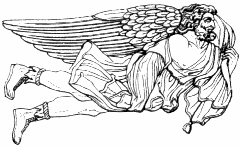I am enjoying reading various mythologies from different cultures and times. I think the commonalities running between them are most interesting as they shed light upon who we are as people of the world rather than as individual nations or cultures. From the readings we have made this far into the semester a few basic elements of all mythological tales have presented themselves, being, for example, beginning/creation, explanation for the purpose of the world and all its parts, moralistic principles on which we build our lives, a structured format for the roles/expectations we must fill as humans, etc. Through these stories we may discover what is important to us ~ such as the purpose/meaning of life and existence.
I found the Mayan story of "The Creation" (595-99) very interesting, especially as we read it alongside the first several chapters of Genesis. I saw several similarities between these two tales, or perhaps I should say I observed how the Mayans' story adopts certain elements of the Genesis story.
At several points "The Creation" it is written that "the Creators were satisfied" with their creations; "What we have created is perfect!" Just as it is written throughout Genesis 1, "And God saw that it was good."
Also, when the Creators made man they declared, "These new creatures will be superior to you [animals] and will rule you" (596) ~ A parallelism of God's creation of man in which he said "God blessed them [humans] and said to them, 'Be fruitful and increase in number; fill the earth and subdue it. Rule over the fish of the sea and the birds of the air and over every living creature that moves on the ground.'" (Gen1:28)
There is an obvious strong connection between the Mayan and Hebrew tales in the form of the "great flood" (597, Gen 6).
I did, however, find it interesting that these great and mighty Creators are only sub par. "Let us try again to create creatures who will praise us and love us" (597). Unlike the God of scripture, they do not desire a relationship with their creation, they do not allow for self-decision and free will in mankind, expecting only one thing from these "perfect" creatures; thus they more easily see faults and feel a sense of dissatisfaction in their great work.




